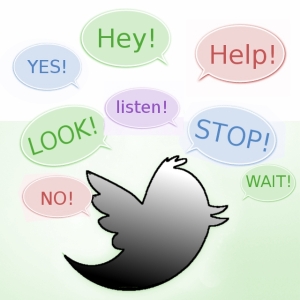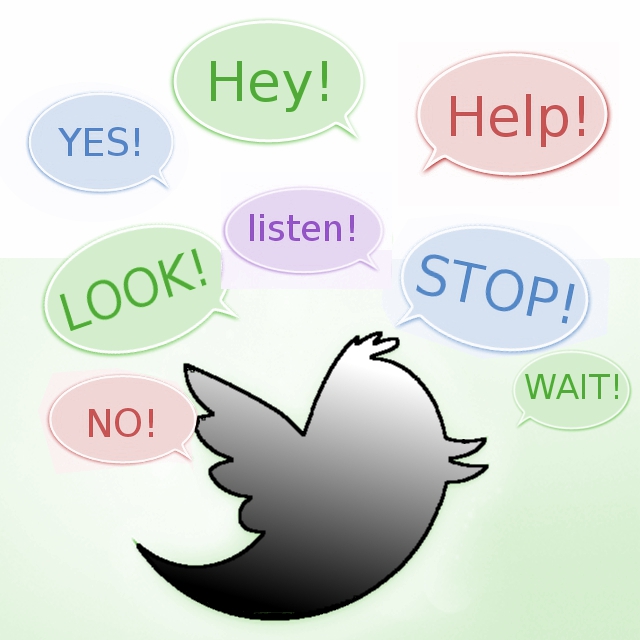 In late 2010, digital activists on Twitter began experimenting with a new form of protest, the “TweetStorm.” I updated this from my old post because there have been a few changes to Twitter, and both Facebook and Google+ have now adopted hashtags, making this an even more attractive concept. Where you read “tweet” below, take that to include status updates on FaceBook, Twitter, and elsewhere.
In late 2010, digital activists on Twitter began experimenting with a new form of protest, the “TweetStorm.” I updated this from my old post because there have been a few changes to Twitter, and both Facebook and Google+ have now adopted hashtags, making this an even more attractive concept. Where you read “tweet” below, take that to include status updates on FaceBook, Twitter, and elsewhere.
What is a TweetStorm?
It’s a coordinated action by many users to tweet about a single issue at the same time, generating a “storm” of tweets.
How does it work?
Anyone can call for a TweetStorm, you just need to decide:
- What will be in the tweet[s] (the text and what hashtags, any special user to target, eg @whitehouse – but use extreme restraint, or risk alienating* a user who can help!
TIP: Choose a new, unique hashtag, but everyone has to keep it secret until right before the event
- What time it has to be sent (essential to choose a time you know lots of supporters are usually online)
TIP: Create an online event that people can sign up for, or make a one-off campaign on thunderclap.it
What next?
- You have to tell people about the TweetStorm, and ask them to get involved by supporting it by sending out a tweet or setting up a scheduled tweet (see below) and by spreading the idea to their followers!
TIP: Contact your most active followers privately, to ask if they will take part and help to recruit others
- Then, you all either keep the TweetStorm text somewhere handy (Facebook event, blog post, pastebin, etc) and tweet at the appointed time, or schedule the tweets to go out at the set time.
How do I schedule a tweet?
TweetDeck includes a schedule tweet feature, and there are some scheduling services available through mobile or online applications, such as Buffer or Hootsuite.
How do I know what time to send the tweet if I am in a different time zone?
Check times in various time zones here: http://www.worldtimeserver.com/ or here: http://www.worldtimezones.com/
And that is about all there is to it.
TIP: If you plan to use TweetStorms as an ongoing tactic, keep some stats, give people feedback, and THANK THEM for taking part
Summary
- Write the tweet(s) and/or choose a unique hashtag and pick some optional @username(s) to target
- Recruit your friends using DM, email, FaceBook, Twitter, Google+ etc. Coach them if necessary
- Remember to set up your schedule if you need to
- Pass the information along – you may want to warn your followers
- Post increasingly frequent reminders as the time approaches, but keep the new hashtag secret
Are TweetStorms Effective?
 Early analysis indicated that TweetStorms were highly effective. Whether that was the result of serendipity or serious effort remained to be proven in those early days. With the benefit of hindsight we can see that Twitter changed their Terms of Service so that sending “unsolicited” tweets, or using certain hashtags, could get your account suspended. Added to that, as Twitter grew and the user interface changed, many people found it increasingly difficult to maintain the level of close, co-operative contact with their network, which a TweetStorm depends on to be successful.
Early analysis indicated that TweetStorms were highly effective. Whether that was the result of serendipity or serious effort remained to be proven in those early days. With the benefit of hindsight we can see that Twitter changed their Terms of Service so that sending “unsolicited” tweets, or using certain hashtags, could get your account suspended. Added to that, as Twitter grew and the user interface changed, many people found it increasingly difficult to maintain the level of close, co-operative contact with their network, which a TweetStorm depends on to be successful.
However, we can say:
- TweetStorms do work, and only thanks to the coordinated actions of concerned individuals.
- TweetStorms are not necessarily successful in isolation; they are an important adjunct to the conversations, petitions, emails, letters and postcards and other campaign actions.
- On Twitter, it is now very difficult to target Trending Topics, so targeted TweetStorms are a good alternative to trending.
- They the draw attention of other users, which can help strengthen a cause.
- TweetStorms are NOT spam. Spam is useless or irrelevant information sent to random or unrelated targets.
- TweetStorms are not meant as entertainment, rather as serious activism for spreading awareness, but you can make them fun, too. They are designed to attract attention from all corners, not only “@UN” or “@StateDept” for example.
- TweetStorms show allies the cause remains strong.
- They also show potential enemies that supporters of the cause are united. Maintaining secrecy of the tag and targets to the last minute also catches opponents by surprise, robbing them of the chance to spoil your plan.
- TweetStorms are democratic in nature: anyone can choose the message, who it targets, and when.
- TweetStorms are relatively easy – with potential high returns for minimal effort and zero outlay
Last Word
As activists, it is important to not only take part in TweetStorms, but to actively encourage others to join. Activism doesn’t stop at the ‘send’ button.
* Aside: When I started TweetStorms, to draw attention to human rights issues in Iran, Amnesty International was a target for more than one campaign. They were not at all happy to see their timeline flooded with our messages (there was no “mentions” column on Twitter back then) and blocked my account. Later, they began using the TweetStorm tactic themselves! And no, they didn’t unblock my account.
The original guides to the TweetStorm idea in several languages are available on these links:
Related articles
- Online Activism is Growing in Popularity
- Digital Activism Tactics: TweetStorms
- You Know Twitter?
- Schedule Twitter Updates Using TweetDeck (techmadly.com)
- New Yorker Releasing Story in Tweets (newser.com)
- Target your Twitter messages with these activist hashtags (allthingsreform.org)
- DemystifyingTwitter. (trendingover40.com)
- Hashtag basics: Why they work, and why they fail (prdaily.com)
- Tweet sparks a storm over SNP policy on Nato (express.co.uk)
- Iranian blogger made Twitter trend after imprisonment




 Fake videos seem to be all the rage these days, while innocent cameramen are being
Fake videos seem to be all the rage these days, while innocent cameramen are being 





